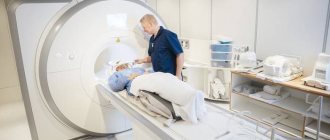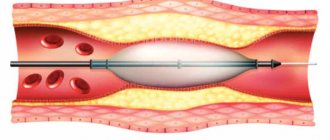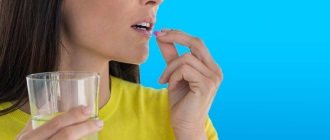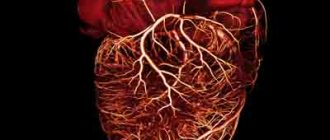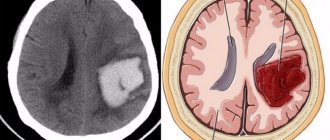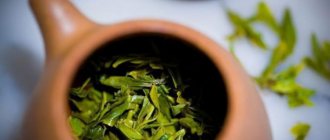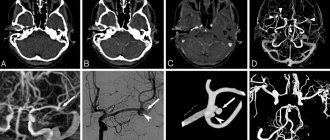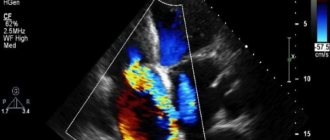A diet after bypass surgery will help you recover and also avoid relapses.
A properly structured diet after cardiac bypass surgery helps maintain the functioning of new blood flow pathways. The main rule is to reduce the intake of cholesterol and simple carbohydrates. A well-designed diet helps with rehabilitation therapy, which, in addition to taking medications and dosed physical activity, includes a complete change in diet.
Lifelong diet should be taken for granted
Adhering to the recommendations for an anti-cholesterol diet is an important condition for returning to normal life for everyone who has undergone surgery and who is recommended to eat a diet after coronary artery bypass surgery. Moreover, this requirement must be observed throughout life. You must strictly monitor your diet and do not take long breaks between meals.
People with chronic heart disease must have vegetables and fruits in their diet. They should always be on hand if you want to have a snack at work, during a long walk or on a trip. It is important to remember this for those around you who want to support loved ones in their desire to live fully and happily.
Why do you need a diet after bypass surgery?
Atherosclerosis of the arteries of the heart appears and progresses against the background of disorders of fat metabolism in the body. The main amount of cholesterol is synthesized in the body (mainly by the liver), it is used to build cell membranes, hormones and vitamins, and about a fifth comes from food. To reduce its formation, medications are used, but they are of no benefit unless you radically change your diet.
Coronary artery bypass surgery relieves a person from the consequences of atherosclerosis, but it does not change the course of impaired metabolic processes. If you continue to lead the same lifestyle, then the installed shunts will also become covered with cholesterol plaques, and attacks of cardiac ischemia will resume or intensify.
Failure to comply with nutrition slows down the body’s recovery process after surgery, nullifies its effectiveness, and leads to the need for repeated medical and surgical treatment. We must strive to develop good eating habits that we must follow throughout our lives. Dietary food should be complete, simple and tasty; for this, you should study the main principles of menu design.
And here is more information about rehabilitation after cardiac bypass surgery.
Drug therapy after valve replacement
Patients undergoing surgery must take medications prescribed by their cardiologist.
- When installing donor valves, the patient will have to take immunosuppressive medications after surgery and for life. This reduces the risk of foreign tissue rejection.
- If a patient has symptoms of cardiovascular disease after valve replacement (for example, he has angina, arterial hypertension, etc.), he should take appropriate medications regularly and on an ongoing basis. The composition of therapy and dosage of medications are determined by the doctor. If at some point the recommended treatment regimen no longer “works” as before, you should definitely consult a doctor for examination and treatment correction.
- If a patient needs valve replacement due to rheumatic heart disease, they may need to take periodic antibiotics after surgery to prevent rheumatic heart attacks.
- All patients with mechanical and biological valves are prescribed anticoagulant therapy. A foreign body is actually introduced into the heart, to which the blood system reacts with increased coagulation. As a result, blood clots can form on the valve, which complicate its operation, can break off and enter the bloodstream, resulting in dangerous and even life-threatening complications - stroke, vascular thrombosis, pulmonary embolism.
Anti-cholesterol diet after coronary artery disease
Dietary nutrition to normalize cholesterol levels in the body is based on the following rules:
- complete exclusion of partially hydrogenated fat (margarine, ready-made sauces);
- a sharp decrease in saturated fats (convenience foods, offal, fatty meats) and simple carbohydrates (sugar, flour);
- sufficient content in the diet of dietary fiber (cereals, bran, vegetables and fruits), unsaturated fat (vegetable oil, fish, nuts, seeds);
- inclusion in the diet of foods with a lipotropic (fat-dissolving) effect (low-fat dairy products, legumes, seafood);
- ensuring a regular supply of vitamins and microelements (fruits and berries, fresh juices);
- calorie content (about 2500 kcal), salt content (only 3 g), free liquid (no more than 1.2 l) are reduced compared to the diet of healthy people;
- The menu limits substances that stimulate the cardiovascular and nervous systems and have a negative effect on the liver, kidneys and intestines.
In order to follow these basic directions for building a diet, diet No. 10 according to Pevzner was developed . It is prescribed to patients with atherosclerosis, hypertension and angina pectoris, after undergoing surgery on the coronary vessels.
First meal
Until the cholesterol level in the blood normalizes, fats, especially meat, are excluded from the diet. They contain a lot of nitrogenous substances that irritate the liver and kidneys. In this regard, young veal, beef, and chickens are more dangerous. It is best to prepare soup from vegetables and cereals, borscht, beetroot soup. Before serving, you can add sour cream (no more than 10% fat), fresh herbs, lemon juice, and then ready-made meatballs from lean meat or fish.
Second courses
Meat can be included in the diet in the form of boiled, baked or minced dishes. Suitable for the diet are chicken, turkey, rabbit, and less often you can eat red beef meat. It is useful to eat fish (carp, pike or pike perch, perch). It is recommended to boil it, cook it with herbs and vegetables in the oven, and serve it in the form of cutlets or meatballs. At least once a week you need to include seafood in the menu (squid, mussels, shrimp, seaweed).
For garnish use:
- porridge with water or half and half with milk (buckwheat, oatmeal, pearl barley, wheat, barley, brown or black, red rice);
- boiled pasta (no more than once a week, only from durum wheat, without store-bought sauces);
- vegetables - fresh salads or boiled and baked dishes, vinaigrette, caviar or vegetable sauté. You can use all types, limiting only potatoes (contains a lot of starch) and fresh cabbage (irritates the intestines).
Green onions, parsley, cilantro, and dill are added to the finished dish. The salad should be seasoned with lemon juice and a tablespoon of cold-pressed vegetable oil. You are allowed to eat 1 egg per day in the form of an omelet or soft-boiled.
Desserts and drinks
It is recommended to include ripe apricots, plums, and apples in the menu. You can make compote, mousse or jelly from them, add them to porridge or cottage cheese, casserole in the form of puree or sliced. In winter they are replaced with dried fruits. All berries are healthy, you just need to limit grapes. Since sugar is extremely undesirable for patients with atherosclerosis, dates, honey, and stevia are used instead.
Allowed drinks:
- weak tea or coffee with milk;
- infusion of rose hips, chokeberries and currants, blueberries;
- cranberry or viburnum juice;
- juice of any composition (except grapes), smoothies from greens, carrots and fruits;
- decoction of dried fruits;
- chicory;
- hibiscus tea, rooibos, herbal;
- fermented milk drinks with no more than 1.5% fat content, completely low-fat are not recommended;
- whole milk if well tolerated.
Other products
In small quantities you can eat dried bread made from second grade flour or rye, with bran, biscuits and one piece of biscuit per day. Cottage cheese is allowed with a five percent fat content (100 g per day), and cheese - up to 45%, no more than 30 g, sour cream and cream 10% up to 2 tablespoons per day for adding to ready-made dishes. 10 g of butter and 2 tablespoons of vegetable oil are allowed. It is very useful to eat nuts (up to 50 g per day).
You can fry only in a frying pan with a non-stick coating and without fat. To enhance the taste, you can use seasonings without salt and hot pepper, herbs, cinnamon, vanilla, bay leaf.
Watch the video about what you can eat after heart surgery:
The benefits of proteins and carbohydrates
Recently, there has been a lot of talk about the benefits of protein diets. The advantages prescribed to them allow patients after bypass surgery to lead a healthy lifestyle without experiencing serious difficulties.
The essence of this diet is that the patient should eat mainly protein foods. This will not only keep you healthy, but also get rid of excess weight. The body spends a lot of energy on the absorption of protein, so the feeling of hunger does not occur for a long time. Women are recommended to consume protein in an amount of at least 120 grams per day, men - at least 180.
An excellent source of protein is fish. After giving up many familiar products, many patients pay special attention to it. Some other types of products will also be useful:
- seafood;
- oatmeal, buckwheat and millet porridge;
- olive and linseed oil;
- vegetables and fruits low in fructose;
- low-fat cottage cheese;
- boiled turkey, rabbit, veal.
These foods are extremely beneficial for the heart after surgery.
Increased protein intake should not be abused. It is impossible to completely exclude fat and carbohydrates from the diet, because there is a high probability of the opposite effect occurring.
Not all carbohydrates are created equal. Their nutritional value may also vary. Carbohydrates contained in foods with a high glycemic index can be consumed. They are found in foods such as cereals, rice, and durum wheat.
Another type of carbohydrate is not recommended for patients after AOS. Very quickly digestible, they contribute to a constant feeling of hunger and overeating. Products containing such “fast” animal carbohydrates include cakes, pastries, carbonated drinks, fast food, juices and nectars containing sugar.
If giving up sweets and starchy foods is difficult, you can find replacements for unhealthy foods. So, instead of sweets, you can eat fruits, cookies can be replaced with dried fruits, for example, prunes. Fiber and vitamins present in plant sweets will have a beneficial effect on the health of not only the cardiovascular system, but also the entire body as a whole.
Drinking water used after bypass surgery should only be used after filtration. The heart is an organ that supports our life and requires careful treatment. In the event of any failure, a person must take all measures to restore and consolidate the effect obtained during treatment.
What to eat after cardiac surgery
as well as products from the following list , are strictly prohibited after coronary artery bypass surgery
- semi-finished and canned meat, fish, pickling, smoking and marinades;
- sausage and frankfurters;
- lamb, pork, duck, beef fat, lard;
- all offal;
- spicy, salty and fatty cheese;
- all factory-made sauces, juices, carbonated drinks, snacks, chips, crackers, fast food without exception;
- baked goods made from white flour, especially cakes and pastries;
- ice cream and jam;
- table salt in the process of cooking, especially with high blood pressure (you can use no more than half a teaspoon per day to add to a ready-made dish).
How to cook food
Diet after coronary artery bypass surgery requires not only a competent choice of products. But they are of high quality preparation. It is extremely irrational to buy healthy red fish and cook it in a “harmful” way - fry it in oil. This dish is completely unsuitable for heart consumption. During the cooking process, you should adhere to the following rules:
- Dishes should not be fried, but baked. During frying, the chemical composition of foods changes, accompanied by the formation of harmful substances such as carcinogens and trans fats. They harm not only the heart, but the entire body as a whole. If you can’t do without fried food, you can use a grill and cook food without using oil.
- For convenience and proper cooking, a double boiler is useful. The steam method is the most convenient and useful, although, admittedly, it is not always loved by many patients. However, if you use your imagination, steam cooking can provide many pleasant gastronomic sensations.
- Patients who have undergone coronary artery bypass surgery should avoid condiments such as ketchup and mayonnaise.
After heart surgery, the patient must follow the principles of a healthy diet. The list of acceptable products is quite wide. This allows you to make the table varied, but not harmful. The most important thing when following any diet is comfort and a feeling of satiety. This can be achieved by choosing foods rich in proteins and healthy carbohydrates. You should be patient, and such a diet will become lifelong, and following a diet to prevent re-clogging of blood vessels will become easy and interesting.
Useful video
Watch the video about products for the heart:
Rehabilitation after cardiac bypass surgery is very important. The doctor’s recommendations on diet, nutrition, and rules of conduct during the postoperative period during coronary artery bypass surgery are important. How to organize life after? Is disability registered?
Cardiac bypass surgery is quite expensive, but it helps to qualitatively improve the patient’s life. How is cardiac bypass surgery performed? Complications after CABG and MCS. Types of bypasses, what is intracoronary. Open heart surgery. How many times can you do it? How long do they live after? Period of hospital stay. How to do it during a heart attack.
It is not necessary to visit a sanatorium after a heart attack, but it is highly recommended. Rehabilitation there has many advantages. Where can I go to continue treatment? Is it required by law?
Pain occurs after stenting as a response to the intervention. However, if your heart, left arm, or shoulder hurts, this is a cause for concern. Since after a heart attack and stenting, this may indicate the onset of a recurrent heart attack. Why does it still hurt? How long will the discomfort last? What will the pressure be - low, high? Can a stent become clogged in the heart, what should I do? Why did shortness of breath appear? Why does my sternum hurt after surgery?
With severe ischemia, it is not so easy to alleviate the patient’s condition and improve blood circulation. Bypass surgery of the vessels of the lower extremities will help. However, like any intervention on the legs, it has contraindications.
Exercise therapy begins after a heart attack from the first days. The set of exercises gradually increases. To do this, doctors determine the degree of exercise therapy for which the patient is ready after myocardial infarction and stenting, if any.
If an aortic aneurysm is inflamed, surgery can save your life. The patient should know what operations are performed, important indicators for surgery, rehabilitation and prognosis after, and the consequences of the intervention. And also about lifestyle and nutrition after. What are the types of aortic replacement, aneurysm replacement and post-complications? How long does endovascular prosthetics take?
Bypass surgery of cerebral vessels is necessary in case of severe circulatory disorders, especially after a stroke. The consequences may worsen the patient's condition without observing the rehabilitation period.
Reconstruction of blood vessels is carried out after their rupture, trauma, formation of blood clots, etc. Surgeries on blood vessels are quite complex and dangerous and require highly qualified surgeons.
Cardiologist - site about heart and vascular diseases
- home
- For patients
- Cardiac surgery
- After heart surgery
What awaits you after heart surgery? What loads are permissible and when? How will the return to normal life take place? What should you pay attention to in the hospital and at home? When can you return to a full sex life, and when can you wash your car yourself? What and when can you eat and drink? What medications should I take?
All answers are in this article.
After heart surgery, you may feel like you've been given another chance—a new license to live. You may think that you will be able to make the most of your “new life” and make the most of the results of the operation. If you have had coronary artery bypass surgery, it is important to consider lifestyle changes, such as losing 5 kilograms or starting regular exercise. This should be taken seriously and you should talk to your doctor about your risk factors. There are books about health and cardiovascular diseases, they should be guides to your new life. The days ahead will not always be easy. But you must move forward steadily towards recuperation and recovery.
In the inpatient department, your activity will increase every day. In addition to sitting on a chair, walking around the ward and in the hall will be added. Deep breathing to clear the lungs and exercises for the arms and legs should continue.
Your doctor may recommend wearing elastic stockings or bandages. They help blood return from the legs to the heart, thereby reducing swelling of the legs and feet. If the femoral vein was used for coronary artery bypass grafting, slight swelling of the legs during the recovery period is quite normal. Raising your leg, especially when you are sitting, helps lymphatic and venous blood flow and reduces swelling. When lying down, you should take off your elastic stockings 2-3 times for 20-30 minutes. If you get tired easily, taking frequent breaks from activity is part of recovery. Feel free to remind your family and friends to keep visits short. Muscle pain and brief pain or itching in the wound area may occur. Laughter or blowing your nose can cause short-term but noticeable discomfort. Rest assured that your sternum is sewn very securely. Pressing a pillow to your chest can help reduce this discomfort; use it when you cough. Don't hesitate to ask for painkillers when you need them.
You may sweat at night, even though your temperature will be normal. These night sweats are normal for up to two weeks after surgery. Possible pericarditis - inflammation of the pericardial sac. You may feel pain in your chest, shoulders, or neck. Typically, your doctor will prescribe you aspirin or indomethacin for treatment.
Some patients experience abnormal heart rhythms. If this happens, you will have to take medication for a while until the rhythm is restored.
Patients after open heart surgery often experience mood swings. You may be in a joyful mood immediately after surgery, but become sad and irritable during the recovery period. A sad mood and outbursts of irritability cause anxiety in patients and loved ones. If emotions become a problem for you, talk to your nurse or doctor about it. It has been established that mood swings are a normal reaction, even if they continue for several weeks after discharge. Sometimes patients complain of changes in mental activity - it is harder for them to concentrate, their memory weakens, and their attention is distracted. Don't worry - these are temporary changes and should disappear within a couple of weeks.
You are usually discharged from the hospital on the 10-12th day after surgery. If you live more than an hour's drive from the hospital, take breaks every hour while traveling and get out of the car to stretch your legs. Prolonged sitting impairs blood circulation.
Although your recovery in the hospital was probably fairly rapid, your recovery at home will be slower. It usually takes 2-3 months to fully return to normal activity. The first few weeks at home can be challenging for your family too. Your loved ones are not used to the fact that you are “sick”; they have become impatient, and your mood may fluctuate. Everyone needs to try to make this period go as smoothly as possible. It will be much easier to cope with the situation if you and your family can openly, without reproaches or showdowns, talk about all your needs, and join forces to overcome critical moments.
It is necessary that you be observed by your regular attending physician (general practitioner or cardiologist). Perhaps the surgeon will also want to meet with you after discharge after one or two weeks. Your doctor will prescribe a diet and medications and determine the permissible loads. If you have any questions regarding the healing of post-surgical wounds, please contact your surgeon. Before you leave, find out where to go in any possible situations. See your doctor immediately after discharge.
Because you may initially experience loss of appetite, and good nutrition is important while wounds heal, you may be sent home on an ad libitum diet. After 1-2 months, you will most likely be advised to eat a diet low in fat, cholesterol, sugar or salt. If you are overweight, calories will be limited. A good diet for most heart diseases limits cholesterol, animal fats and foods high in sugar. It is advisable to eat foods high in carbohydrates (vegetables, fruits, sprouted grains), fiber and healthy vegetable oil.
Anemia (anemia) is a common condition after any surgical procedure. It can be eliminated, at least partially, by eating foods rich in iron, such as spinach, raisins, or lean red meat (the latter in moderation). Your doctor may recommend taking iron tablets. This medicine can sometimes irritate your stomach, so it's best to take it with food. Please note that this may turn the stool dark and cause constipation. Eat more fresh vegetables and fruits and you will avoid constipation. But if constipation becomes persistent, ask your doctor to help with medications.
Discomfort due to pain in the postoperative wound and muscles may persist for some time. Sometimes pain-relieving ointments help if you massage the muscles with them. The ointment should not be applied to healing wounds. If you feel clicking movements of the sternum, notify your surgeon. Itching in the area of a healing wound is caused by hair regrowth. If your doctor allows it, a moisturizing lotion will help in this situation.
Contact your doctor if you notice the following symptoms of infection:
- temperature above 38°C (or less, but lasting more than a week),
- wetting or discharge of fluid from postoperative wounds, persistent or new appearance of swelling, redness in the area of the postoperative wound.
If the wounds are healing, there are no open spots or getting wet, you can decide to shower 1-2 weeks after the operation. Use plain warm soapy water to clean the wounds. Avoid bubble baths, very hot water and very cold water. When you wash for the first time, it is advisable to sit on a chair while showering. Using a gentle touch (not wiping, but blotting), dry surgical wounds with a soft towel. For a couple of weeks, try to have someone nearby when you bathe or shower.
General rules
As a rule, with coronary heart disease , the process of narrowing the lumen of the artery by cholesterol plaque is irreversible and increasing. Restoring the narrowed lumen of an artery with an atherosclerotic plaque using medication does not give the desired effect. Therefore, in most cases with severe stenosis , surgical methods of treating coronary artery disease (bypass surgery, stenting) are the only effective ones to normalize blood circulation in the heart muscle, prevent the threat of myocardial infarction and restore a person’s ability to work.
The operations of coronary artery bypass grafting (CABG) and stenting of the coronary arteries are quite complex and in order to obtain a lasting postoperative effect it is necessary to lead a certain way of life. In particular, diet after heart surgery is the most important component of the treatment process during the rehabilitation period. Moreover, properly organized nutrition after heart surgery allows you to avoid the return of angina and repeated vascular operations.
Nutritional risk factors for the continued development of atherosclerosis and coronary artery disease and, accordingly, repeated vascular operations include:
- high energy value of the diet, contributing to the development of obesity ;
- deficiency of polyunsaturated fatty acids, which normalize cholesterol and reduce its deposition on the walls of blood vessels;
- excess content in the diet of fats containing saturated fatty acids (animal and confectionery fats);
- excessive consumption of cholesterol with a lack of foods in the diet that normalize the metabolism of cholesterol and fats;
- excessive consumption of easily digestible refined carbohydrates (sugar and products containing it);
- increased consumption of table salt, which reduces the activity of fat metabolism enzymes;
- insufficient content in the diet of foods rich in fiber - wholemeal bread, vegetables, cereals, fruits, berries, which reduces the process of removing cholesterol through the intestines;
- excessive consumption of animal proteins, which disrupts vascular permeability, blood clotting and negatively affects fat metabolism;
- insufficient consumption of magnesium, zinc, potassium, iodine, vitamins A , C , B6 , PP , carotene , which slows down the breakdown of cholesterol and disrupts lipid metabolism;
- improper diet with rare and heavy meals.
Accordingly, the general principles of dietary nutrition after CABG and vascular stenosis are to reduce the energy value of the daily diet to 2400-2600 kcal with the consumption of 70-90 g of proteins (animal proteins are reduced to 50%), 80 g of fats (40% vegetable) and 300- 350 g of carbohydrates (with a decrease in the intake of easily digestible carbohydrates).
The protein content in the diet should be no more than 1.0-1.2 g per 1 kg of body weight and is ensured by including fish, low-fat dairy products, seafood in the diet, moderate consumption of lean meat and meat products and limiting the consumption of egg yolks and offal.
Foods rich in extractives and cholesterol are limited in the diet. Table salt is reduced to 5 mg/day. Animal and cooking fats are completely excluded. Increase foods containing dietary fiber (vegetables, cereals, fruits), vitamins , especially C and E and microelements (potassium, iodine, magnesium), which are rich in seafood (squid, seaweed, mussels, shrimp) in the form of independent dishes or as part salads
The consumption of “white” varieties of fish is recommended, since fatty acids from fish fats improve cholesterol metabolism and normalize blood clotting properties, reducing the risk of blood clots . The volume of free fluid is limited to 1.2-1.5 l/day.
Diet after coronary artery bypass surgery
The purpose of dietary nutrition after cardiac coronary artery bypass surgery is primarily to limit the intake of animal and culinary fats containing polyunsaturated fatty acids, low-density lipoproteins, cholesterol and triglycerides, which form cholesterol plaques in the lumen of blood vessels. All fried foods and especially red fatty meat and fatty fish are excluded from the diet. Cold-pressed olive oil is allowed from vegetable fats.
3Rule No. 1 - no alcohol!
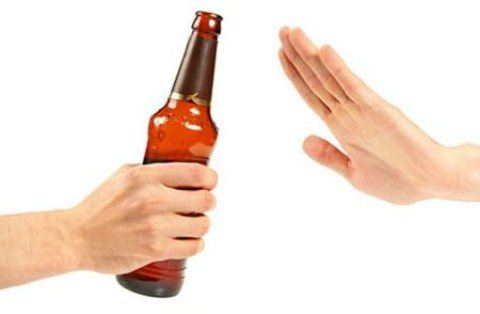
Alcohol ban
Alcoholic drinks are contraindicated for patients who have undergone bypass surgery, as well as other operations on the heart and blood vessels. Alcohol increases the load on the heart, stimulating its contraction frequency, and has a negative effect on the vascular wall, disrupting its tone. Drinking alcohol increases blood pressure, worsening the patient's health condition.
Remember, you are already on the operating table. It’s better to remember the rule once and for all: coronary artery bypass surgery and alcohol are mutually exclusive concepts. Drinking alcohol after heart surgery is not allowed. You should also limit your consumption of coffee, strong tea, and caffeinated energy drinks.
Authorized Products
To reduce cholesterol levels and minimize the risk of developing atherosclerosis and angina, it is necessary to include foods containing polyunsaturated fatty acids, complex carbohydrates and fiber in the diet. The menu should include soups made with vegetable broth with the addition of cereals (beetroot soup, cabbage soup, borscht) and potatoes. For second courses, it is recommended to use lean varieties of red meat (veal, lean beef) and poultry (turkey, chicken), and rabbit. Low-fat varieties of white fish (cod, hake, tuna, flounder) and seafood (mussels, squid, shrimp, seaweed) are extremely healthy. As for fats, the use of vegetable oils (sunflower, olive), preferably cold-pressed, is recommended.
The diet should include dairy products (low-fat kefir, fermented baked milk) and low-fat cheeses. Be sure to include baked goods made from wholemeal flour, yeast-free bread, whole grains, oatmeal cookies and porridge in your diet. You should increase the amount of fruits and vegetables consumed in any form and method of culinary processing. The diet should include freshly squeezed juices from berries (blackberries, strawberries, blueberries) and fruits, almonds, walnuts. Fresh garden herbs and cereal dishes are a must. It is useful to use decoctions of rose hips and wheat bran to improve blood circulation.
Nutrition after coronary artery bypass grafting
After CABG it is necessary to eat properly, otherwise atherosclerotic plaques may re-form. This is dangerous not only due to the development of angina pectoris, but also due to blockage of shunts, which will lead to death. The patient must follow the diet throughout his life. About 3 times a year he must take tests to control the amount of lipids and cholesterol in the blood. The main goal of the diet after coronary artery bypass surgery is to reduce the amount of fat consumed.
Nutrition principles:
- The diet should contain at least 7% saturated fat in total daily calories.
- You should eat as many vegetables and fruits as possible.
- The daily share of transgenic fats should be about 1% of total calories.
- Sugary foods and sweet drinks should be completely excluded from the diet.
- The amount of salt in food should be minimized. The daily intake of table salt is 2300 mg.
- It is necessary to maintain a balance between the intake and utilization of calories. This will help maintain normal body weight.
The patient should drink enough water. This could be mineral water or sugar-free drinks. By following all the doctor’s recommendations, you can reduce the level of lipids in the blood, this will help prevent further progress of ischemic disease.
Protein diet
Recently, a protein diet for people who have undergone coronary artery bypass surgery has been actively promoted. At first glance, these types of diets look attractive and have already gained great popularity in Western countries. The essence of nutrition is to eat foods with a high protein content.
Such programs allow you to significantly reduce excess weight in a short period of time, without feeling hungry. Many people switch to this method of eating because it allows them to consume all prohibited types of foods, while the excess fat is compensated by the reduced consumption of carbohydrates in the diet.
However, the healing qualities of such a diet are very superficial and in fact cause significant harm to the patient’s body. A sharp weight loss occurs due to the active consumption of protein, an excess of which leads to rapid loss of fluid in the body tissues.
By removing carbohydrates from the diet, a person is automatically forced to give up eating foods such as bread, vegetables and fruits, which contain natural starch. Although these products are mandatory for patients after CABG.
It is worth noting other side effects that occur with excess protein. Such phenomena include urolithiasis, bone tissue disorders and many other physiological disorders of the body.
The body also begins to use its own fatty acids from body tissues as an energy source, thus replacing carbohydrates. As a result, a high content of ketone is formed, which is a breakdown product during fat processing. An increase in the level of this substance can pose a significant danger to people with diabetes.
What can you eat?
There are a number of products that will be useful during the recovery period after surgery. They should be consumed in moderation.
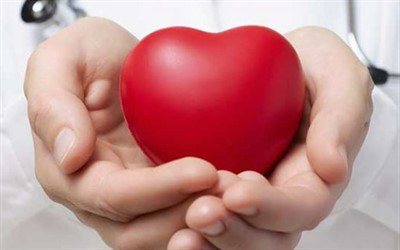
List of permitted products:
- garlic;
- greenery;
- chicory;
- flax seeds;
- bran buns;
- vegetable oils;
- sunflower seeds;
- green and herbal tea;
- lean fish - trout, cod and tuna;
- low-fat dairy products;
- lean meats - chicken, rabbit, turkey.
Vegetable oils help reduce blood cholesterol levels. They prevent it from settling in the vessels.
Garlic helps cleanse blood vessels. The diet should contain unprocessed cereals and grains. However, the amount of rice and semolina consumed should be kept to a minimum.
Vegetables and fruits will be useful not only in fresh, but also in thermally processed form. Dried fruits can be used as a substitute for sweets. Fresh greens contain a large amount of vitamins and microelements that have a positive effect on the cardiovascular system.
Among drinks, you should give preference to herbal and green teas. They thin the blood well. However, before using them, it is necessary to study the contraindications. It is recommended to replace coffee with chicory.
Basic Rules
For patients who have undergone coronary artery bypass surgery, special rules have been developed that must be followed not only during the rehabilitation period, but also after it. The diet after bypass surgery should follow these rules:
- percentage of fat – no more than 7% of total calories;
- transgenic and fatty foods are prohibited;
- eating fish - no more than 6 times a month;
- Drinks containing sugar are not recommended;
- sodium intake should be reduced to 2.3 grams per day;
- monitor the balance of proteins, fats and carbohydrates in the body.
Separately, it should be said about the use of table salt. It has long become a necessity for most people. Patients after CABG will have to greatly limit themselves. Salt causes fluid retention, which, in turn, negatively affects the functioning of the cardiovascular system.
You should not eliminate salt from your diet 100%. Such a diet after CABG will only do harm. Sodium must be supplied in small quantities or the body will borrow it from tissues. This will lead to deterioration in the patient's health. The daily salt intake during the recovery period after bypass surgery is no more than 4-5 grams per day.
Controlling your salt intake is quite difficult. The only option is separately prepared dishes. Salt for them should be poured into a jar daily. This way you can be sure that the weight of what you eat does not exceed the permissible size.
A teaspoon holds 10 grams of salt. The daily norm for a cardiologist patient is from one third to half a spoon. Another tip for those who have difficulty controlling their salt intake is not to use it in the cooking process, but to add salt to the food immediately before eating.
List of prohibited products
Eating certain foods may worsen the patient's condition. Avoiding them will help minimize the risk of complications after bypass surgery.
Prohibited products:
- Fat meat. For example, pork or lard. You should also avoid lamb, beef and veal. It is undesirable to eat sausages, pates and frankfurters.
- Confectionery and sweet pastries. As an exception, you can add a small amount of marshmallows and marshmallows to your diet.
- Fatty fish.
- Fatty dairy products. You should avoid yogurt, kefir and milk with a fat content higher than 1%.
- Sugar. Everything containing this product is prohibited - jam, honey and other sweets.
- Smoked meats, canned food and spices.
- Egg yolks. They contain a large amount of cholesterol.

Complications after coronary artery bypass surgery can be dangerous not only for the health, but also for the life of the patient.
4Rule No. 2 - no adding salt to food!
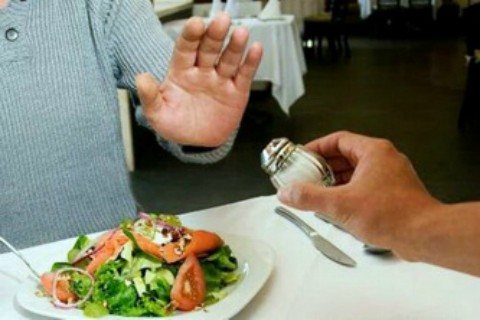
Refusal to add salt to food
After bypass surgery, you should get rid of the salt shaker on the table, as well as the habit of adding salt to food during and after cooking. In practice, cardiac surgeons, cardiologists, and therapists often encounter “heart patients” who salt food before eating it, without even trying it, out of habit... The danger of excessive salt consumption in patients after coronary artery bypass surgery lies in the fact that salt attracts water into the vascular bed, this contributes to an increase in blood pressure, as a result of which the load on the heart and blood vessels increases significantly, and after CABG such loads on the cardiovascular system should be avoided. The permissible daily intake of salt with food in patients after CABG is 1.5-2 grams (for comparison, a level teaspoon is 10 grams).
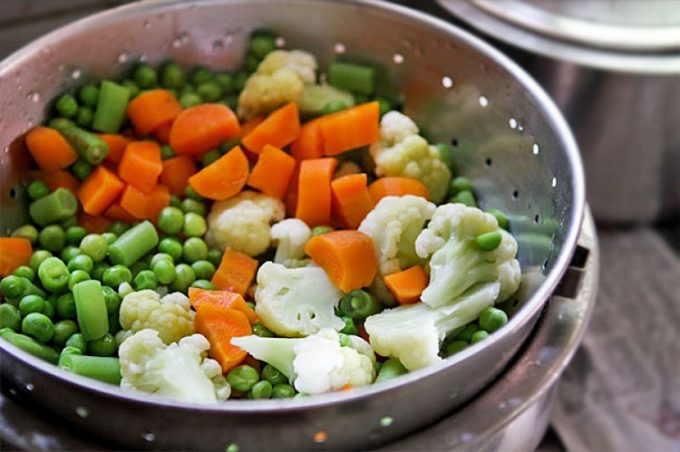
Steaming
Another important point is “not what to eat, but how to cook it.” For example, red fish, which is very good for the heart, can be fried in oil so that it becomes completely unsuitable for consumption by a patient after coronary artery bypass surgery. When cooking, you should adhere to the following aspects:
- Don't fry, but bake. When frying in a frying pan, the chemical composition of food changes, carcinogens and trans fats are formed, which do not add health to the heart and blood vessels. If you want fried food, you should grill the food, or better yet, bake it in the oven in its own juices.
- Buy a steamer. Of course, the healthiest and most useful way of cooking remains steaming. Dishes prepared in this way can be not only healthy, but also tasty.
- Avoid ketchup and mayonnaise.
Proper nutrition after surgery - heart bypass surgery
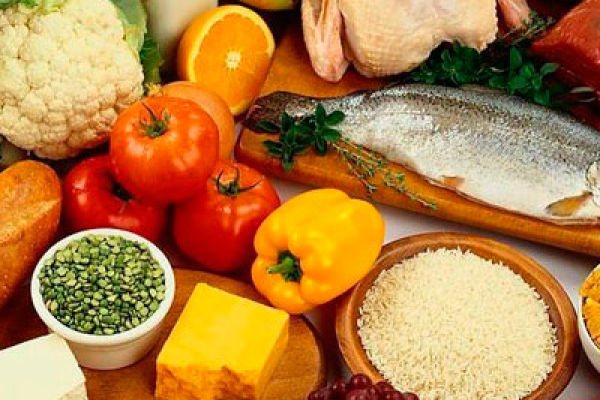
The procedure for bypass surgery involves a long rehabilitation period. After such an operation, it is extremely important that a strict diet be followed, otherwise the surgical intervention will not bear the desired fruit. If you are planning to switch to a healthy diet, you should familiarize yourself with its basic rules, find out what you can eat, and what is better to limit or completely exclude from your diet.
Work after valve replacement
Within a few weeks after surgery, patients usually manage to restore their ability to work at their previous level. In some cases, a transition to easier working conditions is required. Sometimes patients are given a disability group.
The above formulations are quite streamlined, but it is impossible to give specific figures here. Much depends on which valve was prosthetized, what type of artificial valve was, in connection with what disease the operation was performed, and in what field the person is employed.
In general, the forecast for work activity is favorable. Even professional athletes returned to sports after this surgical intervention and successfully continued their careers.
Therapeutic diet - basic rules
When drawing up a meal plan for those who have undergone heart bypass surgery, it is necessary to emphasize that the consumption of foods containing harmful cholesterol and fats in large quantities is strictly prohibited. This is due to the fact that their excess in the body, like carbohydrates, has a detrimental effect on the health of blood vessels, clogging them. As a result, the question of the return of the disease becomes acute. But even despite such caution, throughout the life of a person who has undergone such operations, he will need to carefully monitor his weight so that it stays at approximately the same level. Therefore, in this case, the credo in life should be: “moderation is above all!”
Important! Those who have undergone such operations need to monitor the amount of sugar and table salt consumed. It is better to replace the former with stevia, and the latter with a marine analogue, which, due to its high iodine content, is even good for the heart.
Foods that should be avoided after cardiac bypass surgery:
- fatty meat (pork, lamb, beef, duck, goose, lard);
- sausages – sausages, ham, small sausages, shank;
- hard cheese;
- homemade dairy products (cream, sour cream, butter);
- fatty fish with high cholesterol content (halibut, catfish, stellate sturgeon, herring, sturgeon and saury);
- pasta made from premium wheat flour;
- any semi-finished products;
- alcoholic drinks;
- sparkling water;
- fried potatoes.
For vascular health, it is strongly recommended to exclude sweets and baked goods from your diet, or limit their consumption as much as possible. Nutritionists say that if you eat no more than 30 g of food containing carbohydrates at a time, it will not cause harm to your health. This portion of glucose is quickly consumed by the body.
General diet rules
Cardiac bypass surgery entails not only the restoration of blood flow, but also the establishment of proper nutrition.
In this case, proper nutrition means a diet in which the blood vessels will be protected from re-clogging, and the body will be provided with everything necessary for its healthy functioning. Overeating is also harmful for a healthy person: they lead to diseases of the gastrointestinal tract and excessive weight gain. What can we say about a person who has undergone surgery? Of course, this factor must be excluded. Portions should be reduced to adequate sizes so as not to leave the table with a feeling of heaviness in your stomach.
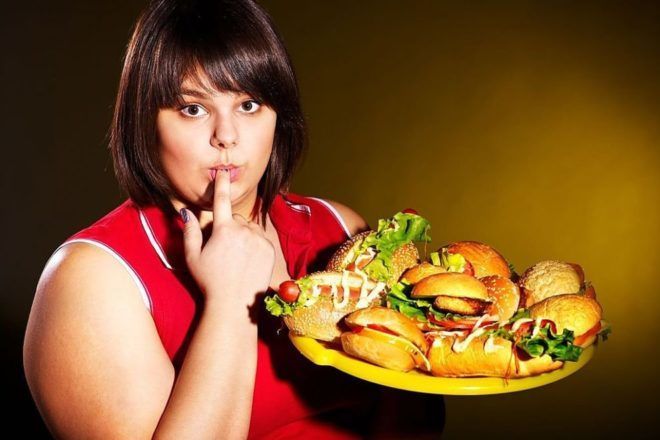
Overeating is bad for your health
In addition to overeating, the same type of diet should also be avoided. Of course, you can choose three or four that you like from the list of healthy foods and eat mainly them, but in the end this will not bring any benefit. The diet after heart bypass surgery should be varied.
Another important point is limiting salt. It is impossible to completely exclude it from the menu, but it is necessary to reduce its amount, since salt promotes the formation of edema and creates additional stress on the heart. The same can be said about water - you need to drink, but in moderation.
Well, one more constant condition of all healthy diets is steaming food. You should avoid frying altogether; it is better to sometimes allow yourself to bake in the oven in foil - the taste will be much brighter than that of steamed and boiled dishes, but all the disadvantages of frying will be eliminated.
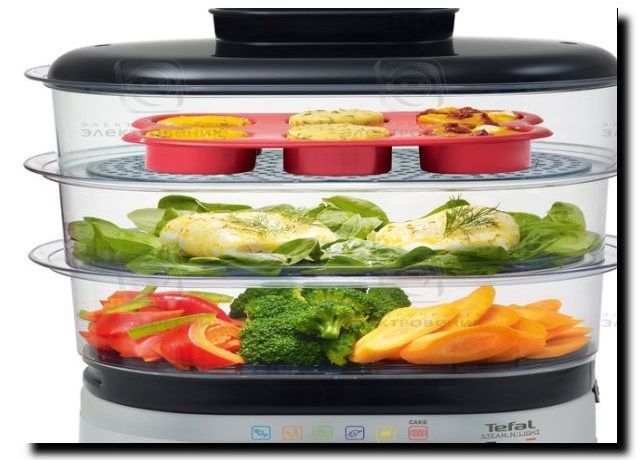
Steam food for health
How to replace fats
After bypass surgery, it is of great importance to protect blood vessels from cholesterol plaques that close the gaps in them. Since these plaques form due to eating a large amount of fatty foods, it is logical to remove them from the menu or minimize the intake of such substances into the body. For this purpose, you should pay attention to the following products:
- low-fat cottage cheese (0%);
- milk 1.5%;
- dietary cheeses;
- tofu;
- Soy meat;
- white chicken;
- rabbit carcass;
- turkey;
- veal;
- cereals, with the exception of rice and semolina.
Special attention should be paid to the benefits of fish oil for the heart. If you regularly use it as a food additive to main dishes, it will help protect your blood vessels from cholesterol. This is possible due to the content of omega acids in the product. In light of this, in addition to fish oil, nutritionists recommend eating 100-200 g of sardines, herring or salmon to maintain heart function 2-3 times every 7 days. This fish is a moderately fatty fish.
What else can you eat after cardiac bypass surgery?
Margarine, mayonnaise and butter are not included in the group of permitted products for operated patients. The same applies to sunflower oil. Nutritionists advise replacing it with olive oil obtained by cold pressing. It does not contain polyunsaturated fatty acids that are harmful to the heart. It is allowed, but only in limited quantities, to consume beef and/or chicken liver, as well as kidneys. As an alternative, you can consider boiled rabbit, turkey and veal.
In order for rehabilitation after surgery to go smoothly, it is important to adhere to the following rules:
- calorie consumption during exercise should not be more than their excess;
- It is strictly not recommended to consume alcoholic beverages in any form;
- Monitor your intake of sodium (one of the components of table salt). This figure is supposed to not exceed 2 grams per day.
- It is extremely undesirable to drink sweet drinks - coffee, soda, compotes, juices, etc.;
- if the diet includes fatty transgenic products, then their percentage of total consumption should not exceed one unit;
- the emphasis in the menu should be on fresh vegetables and fruits that have not been subjected to heat treatment;
- Cooking dishes based on fish or fish oil is encouraged, but not more than 5 times every 30 days;
- for dairy products of all types, the fat content threshold should be no more than 1%;
- The rate of cholesterol intake per day is no more than 200 mg;
- Fats should account for 6% of calories eaten.
By adhering to the above-described recommendations of nutritionists, you will not need to worry about various complications after surgery. The diet will help normalize the patient’s condition and direct his life back on track.
Nutrition after coronary artery bypass surgery (CABG): diet rules and recommendations
Animal fats
Eliminate animal fats from food, which contribute to the accumulation of cholesterol. Penetrating into the blood, harmful fat molecules settle on the vascular walls, slowing down the blood flow and preventing the normal supply to the heart.
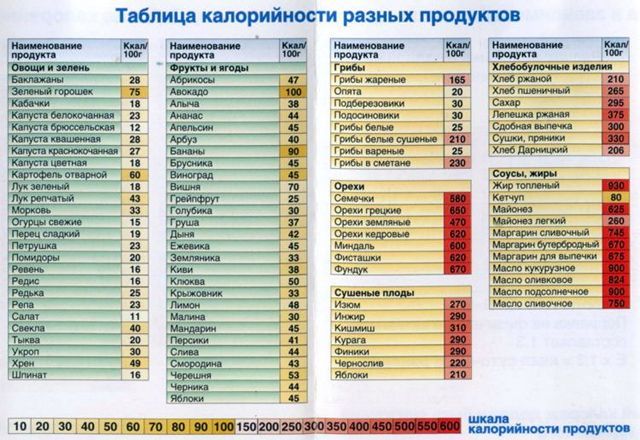
Plaques block the lumen, create a health risk, provoking atherosclerosis.
By excluding fatty meats, fast food, processed foods, sour cream, mayonnaise, cream and butter based on them from the diet, you can replace these components with healthy analogues - chicken, turkey, veal, and low-fat dairy products. Fish is not prohibited for consumption.
On the contrary, the product of the deep sea contains useful omega acids, which should be included in the menu 2 times a week. White varieties are preferred, including flounder and cod. And red fatty varieties - trout, salmon, salmon. You can't eat crayfish or caviar.
Vegetable oils
Include vegetable oils in your diet after cardiac coronary artery bypass surgery. The fatty substance slows down atherosclerosis and is beneficial due to the content of polyunsaturated acids. In addition to butter, the diet should be supplemented with cereals, nuts, and seeds. It is important to understand that high-calorie foods must be strictly dosed. The daily norm is 3 tablespoons.
Bakery
Remove soft pastries and sweet baked goods from the table. The diet after coronary artery bypass grafting does not include cakes, pies, and pastries among the permitted items. Instead of harmful carbohydrates, which include ice cream, soda, jam, give preference to cereals, black bread, vegetables and fruits. Greens are useful.
It’s good if you can get a product grown in your own garden, it is rich in vitamins and beneficial microelements. Vegetables should be taken fresh or frozen, stewed or baked. It is important to eat forest and garden berries. Those with a sweet tooth are allowed sweets, no more than 2 pieces per day.
This dose is enough to lift your spirits and not cause harm to your health.
Salt
Reduce the amount of table salt you consume. Nutrition after coronary artery bypass surgery should include low-salt foods. Salt retains fluid in the body and prevents it from being excreted naturally, slowing down processes in the body. This contributes to an increase in pressure and increases the load on the heart muscle. It’s also not worth rushing to extremes.
Chlorine and sodium - components of salt - are beneficial in limited quantities, so switching to a completely salt-free diet is not rational. The daily dose of the product, which is not capable of causing harm, is up to 5 grams. This is a teaspoon of salt for two days.
To control the process, nutritionists suggest salting food at the time of eating, and not during the cooking process.
Alcohol after CABG
A separate topic is alcohol, which heart surgeons advise to exclude from the diet if the patient is planning a long life. This rule applies to all stimulants - coffee, strong tea with a high tannin content, energy drinks. Any food that contains caffeine should be excluded from the diet after coronary artery bypass surgery.
The harmful additive provokes spasmodic contraction of blood vessels. Alcohol is prohibited after CABG in any quantity. The stimulator causes the heart to beat faster and more intensely, causing changes in the myocardium and the risk of arrhythmia.
Having a negative effect on the liver, alcohol-containing drinks provoke the release of toxins and harmful lipid fractions into the blood - a favorable environment for atherosclerosis.
Limit water in your diet. If there are signs of chronic heart failure, water consumption is discussed with your doctor. A healthy person drinks more than 2 liters a day without harm to well-being. The patient needs to limit the consumption of liquids that can cause swelling. Filtered liquid, mineral water, and spring water are suitable for food.
Patients often ask how long to follow a diet after CABG and how strict the diet should be. The answer is obvious - the menu is created without an expiration date. You should adhere to simple but effective rules for the rest of your life. This will help prevent relapses and create a healthy diet to maintain good health.
The nutritional program is prepared by the attending physician, but there are rules for eating foods after bypass surgery. According to the recommendations:
- In the total number of calories, the fat content does not exceed 7%.
- Cholesterol is limited to 250-300 mg in daily food intake.
- Dairy foods should contain fat not exceeding 1% of the composition.
- Sweet drinks should be replaced with liquid without additional added sugar.
- It is worth maintaining a balance, maintaining a harmonious ratio of calorie content of the daily diet and calorie expenditure during physical activity.
Many sites recommend that patients after CABG adhere to the principles of protein nutrition. The programs allow you to quickly lose weight and tighten your figure without the painful feeling of hunger from food restrictions.
You should not follow the advice of non-specialized resources without discussing nutritional principles with your doctor.
A protein diet can harm the body, forcing the patient to give up healthy carbohydrates, vitamins, and microelements.
The purpose of the operation is to create new pathways for blood flow, bypassing vessels that are narrowed and blocked, so that the heart muscle is provided with adequate access to oxygen and nutrients, and thereby help the cardiovascular system function normally.
After such a complex operation, the patient remains in the intensive care unit for some time under the close supervision of a doctor until his condition stabilizes. And only then the patient is transferred to the general ward for rehabilitation activities.
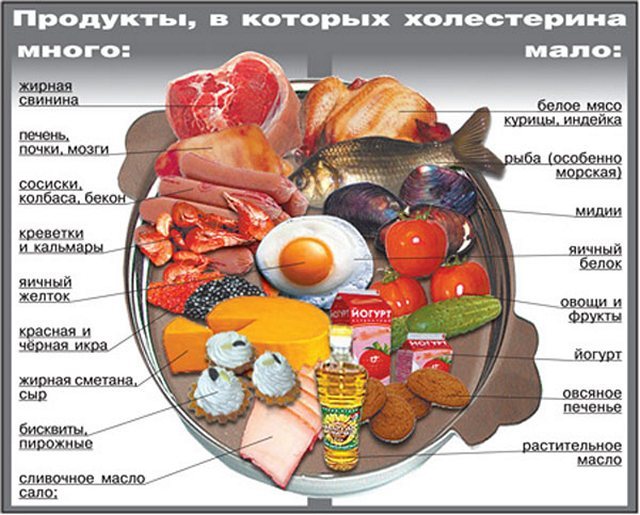
Rehabilitation
The rehabilitation program includes recommendations for serious lifestyle changes in order to minimize the likelihood of re-sclerosation of blood vessels and the occurrence of coronary artery disease again.
Such recommendations include: complete renunciation of bad habits such as smoking, drinking alcohol, measures aimed at weight loss, control and lowering of cholesterol and blood sugar, regular monitoring of blood pressure, and finally, it is very important to change your diet.
Diet after bypass surgery
All the efforts made by surgeons may soon be in vain if the diet is not followed and if one does not eat properly.
Because atherosclerotic plaques may form again, which will not only lead to the development of coronary artery disease and angina, but can clog the shunts and even cause the death of the patient.
Here are the dietary recommendations given by the European Society for the Study of Atherosclerosis.
The main goal of proper nutrition after bypass surgery is to limit the intake of all fats. First of all, completely eliminate fried foods, especially meat and fish. Butter and margarine containing polyunsaturated fatty acids should be limited.
And completely eliminate melted and sunflower oil. You can replace them with olive oil, only cold-pressed. Of the recommended meat products, the best is boiled lean red meat (preferably veal), kidneys, liver, in limited quantities.
As well as chicken or turkey, rabbit, and game (duck, partridge, hare).
Not recommended
Any meat with fat, lard, bacon, any sausages, meat pastes and pates are not recommended. For dairy products, skim milk, low-fat cheeses, and low-fat kefir are recommended. Restriction will help reduce or prevent the effects of heart bypass surgery.
Diet supplement after heart bypass surgery
Among fish products, “white” varieties of fish are recommended. This is cod, flounder. You should not eat crustaceans or fish eggs. Another important aspect of the post-bypass diet is to increase your intake of fruits and vegetables in your diet. Any fresh and fresh frozen vegetables are shown. Legumes - peas, beans, lentils, olives.
Baked or boiled potatoes. Fresh fruits and freshly squeezed juices, walnuts, almonds. Berries, especially wild berries, blackberries, strawberries, blueberries, will be very useful. Daily consumption of any greens from the garden will be very useful for maintaining cardiovascular activity.
This is especially true for spinach leaves, which are rich in many beneficial microelements, vitamins and folic acid.
- As for bakery products, wholemeal bread, whole grains, oatmeal, oatmeal and cookies, and yeast-free bread are recommended.
- Don't forget to drink
It is important to maintain proper drinking regime. It is necessary to drink in sufficient quantities only filtered water, high-quality purification, mineral water and some drinks without sugar. Sweetened and carbonated drinks should be completely avoided.
And no alcohol! Our heart is the engine of the body. It needs to be protected and looked after. Recently, it has been noticed that most often the development of cardiovascular diseases is caused by improper and uncultured nutrition.
It is easier to prevent complications of coronary artery bypass grafting than to treat them. Take care of your heart by eating right!
Cardiac bypass surgery entails not only the restoration of blood flow, but also the establishment of proper nutrition. In this case, proper nutrition means a diet in which the blood vessels will be protected from re-clogging, and the body will be provided with everything necessary for its healthy functioning.
Overeating is also harmful for a healthy person: they lead to diseases of the gastrointestinal tract and excessive weight gain. What can we say about a person who has undergone surgery? Of course, this factor must be excluded. Portions should be reduced to adequate sizes so as not to leave the table with a feeling of heaviness in your stomach.
Overeating is bad for your health
Diet nuances
Heart-Healthy Diet Meals
To maintain stable heart function after bypass surgery, it is important to eat not only right, but also regularly. This means that you should not skip a single meal. Breakfast, lunch and dinner are sacred affairs for a patient who has undergone an intervention such as bypass surgery. But no less healthy are snacks, for which fruits and vegetables, cottage cheese casseroles made in a double boiler, and various unsweetened desserts are ideal. However, under no circumstances after surgery should you overeat at night, especially heavy food. In addition to these products, the following dishes will also be relevant:
- Pancakes made from rye flour with stewed salmon or salmon wrapped inside
- Vegetable soup with barley and black croutons
- Canned corn with oven-baked tuna or cod as a salad
- Yushka with fresh carrots and lentils
- Pea mash
- Oatmeal on water
- Oranges and grapefruits
- Oven-baked apples with avocado
- Pine nuts with herbs and lettuce
- Rye flatbreads with avocado cream sauce
- Lean sardines
- Oat pancakes with low-fat sour cream
- Fish stewed in tomato
- Egg omelet with dill
- Beetroot with walnuts and sesame oil
- Squash caviar without pre-frying.
What you need to know before surgery
After hospitalization, a comprehensive examination of the patient is carried out in the hospital. This is necessary for assessing the general condition, choosing a CABG technique, making a prognosis for the course of the postoperative period and rehabilitation.
It is not recommended to eat any food in the evening before surgery. No more than one glass of water per night is allowed. In the morning, the patient undergoes procedures: takes a hygienic shower, shaves the hair at the site of the future incision, and gives an enema to cleanse the intestines.


